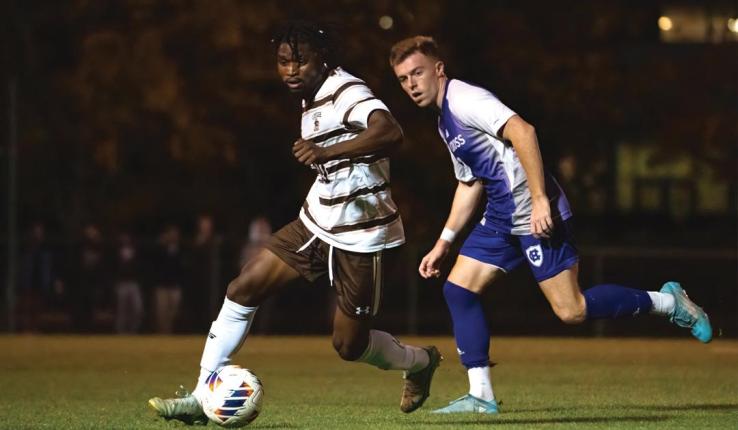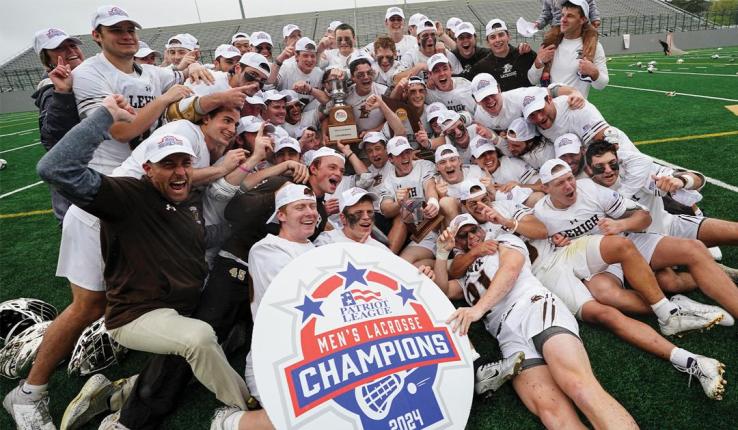David Zirin Examines Connections Between Sports and Politics
Dave Zirin, a provocative, award-winning sports writer, examined the “connective tissue” between sports and political movements in a wide-ranging talk that lasted an hour and 15 minutes last week in Baker Hall.
Zirin, sports editor for The Nation, recounted a career that allows him to merge his lifelong love of sports with insights into the intersectionality of sports with race, politics and culture. He was the first speaker invited to campus as part of “Race X,” the theme of this year’s presentations sponsored by the Martin Luther King Committee.
“I grew up a die-hard sports fan and I played every sport you could think of,” said Zirin. “My primary sport was basketball. I was the team’s starting center, and if you know anything about basketball, you know you’re supposed to be a lot taller than I am.” And, he added, his team’s name of the “Fighting Quakers” didn’t exactly strike fear in opponents’ hearts.
But his devotion to sports exposed him to a pivotal moment in 1996, when he learned that NBA star Mahmoud Abdul-Rauf was refusing to stand for the national anthem before his games.
“Sound familiar to anything going on right now?” Zirin asked his audience, referring to the current controversy surrounding former San Francisco 49ers quarterback Colin Kaepernick, who began expressing his support for the Black Lives Matter movement by kneeling while the national anthem was played prior to his games during the 2016 football season. Since then, Zirin said, Kaepernick’s gesture has prompted other professional sports teams to join the protest in solidarity, and has even reached down to the level of youth sports, cheerleading squads and marching bands.
This year, a series of presidential tweets refocused attention on the pre-game behavior of the athletes, which led to a recent discussion of NFL team owners considering the disciplining of players for their refusal to stand. The controversy continues to rage. In his talk, Zirin sought to underscore the historical significance of this and other actions taken by athletes to use their public platforms to advocate for social justice.
“You can’t talk about Colin Kaepernick like he came from Planet Protest without understanding what led him to take the stand he did,” Zirin said, describing an athlete who is both “incredibly intelligent and incredibly introverted.” Deeply upset by ubiquitous online videos of black men being shot and killed by police officers without consequence, Kapernick decided to silently protest on the bench and to donate to activist causes, Zirin said.
“He essentially said, ‘I’m not going to stand up and show my pride for a flag when there are bodies in the street, and people are getting away with murder,’” Zirin said.
Kaepernick is not currently an active NFL player; he is pursuing a case against the league owners for allegedly colluding against him. But Zirin said the protest movement triggered by the former 49ers quarterback has been effective in that NFL owners have not decided to impose penalties on players who refuse to stand for the national anthem.
“[Kaepernick’s] action, and the support of other players, managed to wrest concessions from 32 of the most conservative billionaires on the planet,” said Zirin. “That’s called winning.”
Such victories rarely happen in a vacuum, and history serves as the best guide, said Zirin, who harkened back to the response by Abdul-Rauf when he was asked in 1996 about his personal protest by a reporter in the Denver Nuggets locker room.
“He told him that he just wasn’t comfortable with the idea of sports and patriotism being intertwined, and that while the flag was a symbol of freedom and democracy to some, it’s a symbol of tyranny and oppression to others,” Zirin said.
'Activist Athletes'
That development led Zirin to learn more about courageous “activist athletes” and their social, cultural and political impact, going back to Jackie Robinson, who is mostly remembered for breaking the color barrier in Major League Baseball in 1947. What is not as well known, Zirin said, is that Robinson continued the struggle for social justice till the end of his life, touring the south as a barnstorming speaker for civil rights. In fact, he was so widely sought after as a speaker that groups and organizations would often “settle for Martin Luther King as their second choice” if Robinson wasn’t available.
“Even Dr. King credited Jackie Robinson with having enormous impact and dedication, saying that he was ‘a freedom rider before freedom rides, and a sit-inner before there were sit-ins.’ But by the time he passed away in 1972, he was a man with a broken heart,” Zirin said. “And he detailed why in his autobiography, I Never Had it Made.”
In the book, Robinson delivered a candid re-telling of a lifelong struggle for equality and the work he felt he left undone. Yet, said Zirin, Robinson’s impact paved the way for Muhammad Ali, who will be remembered as one of the world’s greatest athletes, as well as an intensely driven and committed advocate for social justice.
Zirin, who has authored several books on Ali and his sociopolitical impact, painted a picture of Ali’s time in the national spotlight, beginning with a debut while he was only 18 years old, and was “utterly unapologetic about speaking out, talking about how great he was, and how pretty he was. As you can imagine, this was not well-received by the largely right-wing, mainstream boxing world.”
To illustrate how threatening Ali was, Zirin described the lead-up to the highly anticipated fight in 1964 between the brash, young fighter and the veteran heavyweight champion Sonny Liston, who, he said, “was always portrayed as this hulking menace, until he was supposed to discipline this young upstart who they thought—in a throwback to slavery—as someone who was too big for his britches.”
After shocking the boxing world and defeating Liston, Ali (then known as Cassius Clay) didn’t celebrate, but instead went to a small motel on the “tan side of town” and spent the night talking with a group that included singer Sam Cooke, NFL fullback Jim Brown and Malcolm X.
Through discussions with that group, the late comedian and social activist Dick Gregory and others, Ali moved toward conversion to Islam, which cemented the controversial anti-war stance that dramatically impacted his career.
“You have to remember that back then, Muhammad Ali was absolutely as despised by sections of the media as Colin Kaepernick is today,” Zirin said. But in his own time, he added, Ali’s impact was acknowledged not only by Martin Luther King, but also (late South African President) Nelson Mandela, who said radio reports of Ali’s victories made him feel “closer to freedom” while he was imprisoned.
Zirin devoted a significant portion of his talk to Olympic athletes John Carlos and Tommie Smith, who famously accepted their 1968 Olympic medals with their black-gloved hands thrust defiantly in the air. Although this gesture continues to be erroneously referred to as “a black power salute,” Zirin said the act was “more reflective of a movement, not a moment.”
Both athletes—with the support of Australian sprinter Peter Norman, who shared the podium with Carlos and Smith—had been involved with the Olympic Project for Human Rights, which had earlier issued a slate of demands for social justice within the sports world, including the expulsion of then-president of the International Olympic Committee Avery Brundage.
Prior to his death a few months before the 1968 Olympic Games in Mexico City, Dr. King had advised the athletes that their planned action was, Zirin said, “like a big rock that you drop into a pond. You’re not sure how far out the ripples will take you, but you need to throw rocks.”
In discussions Zirin had with Carlos decades after the event, Carlos vividly recalled the reaction of the stunned crowd in Olympic Stadium. “He said, ‘It was so quiet that you could hear a frog piss on cotton,’ and then the people started booing and then they started throwing trash.” But the most significant fallout from the event was probably reserved for Norman, who was widely derided in Australia for his support of the black American athletes.
Norman, who died in 2006 at the age of 64, told both Carlos and Smith that standing with them “was the greatest privilege of my life,” Zirin said. “And both men were lead pallbearers at his funeral.”
Following his talk, Zirin fielded a series of questions from the audience on the significant role that female athletes, such as Serena Williams, have played as change agents, and the importance of white athletes to protesting African-American athletes.
“Many athletes have told me that they really want more white athletes to do this,” he said. “They say that any efforts to take some of that weight, it’s a huge deal to them.”
In introducing Zirin, Professor James Peterson said that when the MLK Committee was discussing bringing in the provocative sportswriter and author for the first speaker of the academic year, “I don’t think any of us anticipated the way protest in national sports would become such a flashpoint in our discourse, so it’s exciting to do a program that is so relevant.”
Peterson, who is the interim chair of the university-wide MLK Committee, said the group will continue to offer speakers over the course of the next two years who will provide insight into the number of issues that intersect with race.
Posted on:





